
To enhance synergies with existing investments, particularly in social protection, livelihoods and school meals, WFP is strengthening nutrition-sensitive prevention activities in 5 districts (Chikwawa, Phalombe, Balaka, Mangochi and Neno) in the Southern region.
According to the SMART nutrition survey conducted in 2019 and 2020, the Global Acute Malnutrition (GAM) rate remains low showing that investments in nutrition are paying off. However, stunting prevalence—a sign of chronic malnutrition—remains high at 37 percent. Even with the decline in undernutrition, continued efforts are needed to address micronutrient deficiencies and the high rates of stunting.
In early childhood, under nutrition has negative life-long and intergenerational consequences; undernourished children are more likely to require medical care as a result of under nutrition-related diseases and deficiencies. This increases the burden on public social services and health costs incurred by the government and communities.
Stunting has to be prevented through a multi-sectoral approach through interventions that promote healthy growth in the child especially in the early years of life.
In this context and analysing the gains so far in the reduction of undernutrition, WFP reshaped its nutrition strategy to focus on the prevention of undernutrition, particularly stunting and micronutrient deficiencies with an emphasis on nutrition-sensitive programming, evidence generation and capacity strengthening for Government at national, district and community levels.
